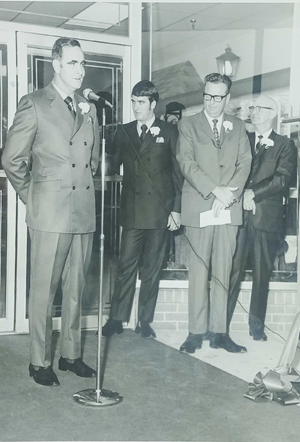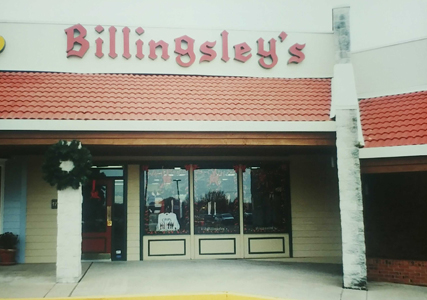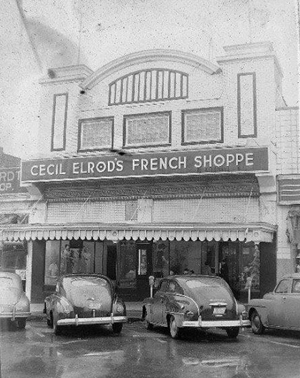By Becca George
Paris, New York and Milan are some of the most fashionable cities in the world. These are the cities where trends begin and then spread across the country and the world. Murfreesboro has some wonderful fashion of its own and many local and national shops to help residents look their best. But where did it begin? There were many who helped shape the fashion in Murfreesboro and bring high end attire to what was then a small town.
THE BUTTERCUP
Women’s fashion has seen many changes over the years from blazers and shoulder pads to slip dresses and mary janes. The Buttercup, a highend women’s boutique, supplied Murfreesboro women with specialty clothing from 1977 to 2004. The Buttercup, started by Nancy Coleman and her mother Ruth Wood, had true southern roots. “We carried everything from sportswear to dresses,” explains Nancy. The Buttercup, which was located first on East Main Street, carried items that the department stores did not. “We had classic, beautiful clothing that appealed to so many different ages,” says Nancy. Nancy and Ruth would go to market each year to hand-pick items geared toward the women who shopped at The Buttercup. “We tried to get things that we like, I think that was the beauty of it,” explains Nancy.

In addition to clothing, The Buttercup carried jewelry, purses, shoes and accessories. “We had items for all ages, women my mother’s age, my age, and even college. It was just really beautiful, classic clothing and all the women in my family took a hand in it.” says Nancy. When The Buttercup opened in 1977 there were no malls in Murfreesboro and not as many options to get fashionable and high end apparel and accessories. “What I think is the funniest thing,” laughs Nancy, “We carried these sweaters by Michael Simon, Bellepointe and Eagle’s Eye. I have storage boxes full of them and now my daughter wears them to ugly Christmas sweater parties.” Nancy still has people stop her and tell her about the clothing they have saved that was purchased at The Buttercup. “Some of the things we carried could still be relevant today, they were so classic and well made,” says Nancy, “I can remember the Anne Klein purses we carried. There was a scene in working girl where she is carrying an Anne Klein purse with her suit. We had that at the store.” The Buttercup also offered free alterations and gift wrapping.
“Men would often come in for Christmas gifts. They truly missed it when it was gone,” laughs Nancy. Ruth Wood was the inspiration behind The Buttercup and had always wanted to open a women’s boutique. “She was just a true southern lady, and she was beautiful,” explains Nancy. The Buttercup was a true family business. Nancy’s sister, Susan Vanderpool, was also a large part of the shop and eventually her brother, Jim Wood, bought The Buttercup for his daughter, Jennifer Anderson, to run. Nancy ran the shop for 19 years until she and her husband started a family. “I took my son to market one time and then told my mom I wanted to stay home with him,” remembers Coleman. “Murfreesboro was a really small town and to be in business that many years you meet a lot of people,” explains Nancy, “Almost every time I am out I see someone who shopped in the store.” The Buttercup was truly a business that incorporated many. “Our friends worked in the store, it was just like a family,” explains Nancy. Ruth, Nancy and Susan all spent time at The Buttercup.
“We all traveled to market together,” says Nancy, “It was several generations.” Her niece Jennifer spent a lot of time at The Buttercup growing up so it was a natural transition when she took over. The Buttercup was the first recipient of a Ruthie’s Award for “best women’s clothing store” twenty-four years ago. Three generations of women helped to shape fashion and what was available in Murfreesboro for many years leaving a lasting impression on all those who shopped at The Buttercup.
BILLINGSLEY'S
Suits have been a staple in men’s fashion since the 19th century. Styles and cuts have changed but a well-made suit has remained an integral part of a man’s wardrobe. Adron Billingsley, owner of Billingsley’s for 27 years, always knew he wanted to sell men’s clothing. “I didn’t have a desire to do anything else,” explains Billingsley, “I worked one week at a feed store, that was the hardest job I ever had.” The feed store led to a job at a small men’s clothing store in Columbia where Adron worked from the time he was in high school. “I started there and almost got fired,” he explains, “I had a complex, I didn’t like to wait on people.” Billingsley realized quickly that the alternative was cleaning the store and decided he better learn quickly to wait on people. And learn he did, in 27 years and 2 locations he waited on and served many in the Murfreesboro community. Before opening Billingsley’s in 1969 he worked in the shop in Columbia for 17 years and then went to Pigg and Parson’s who transferred him to Murfreesboro in 1962. “I think that was the best move I ever made,” explains Billingsley, “In my lifetime I did what I wanted to do, I may not have made the money I wanted to make but that is my fault,” laughs Adron, “Oh yes, I loved it.”

Billingsley’s carried an array of men’s goods and specialized in fine suits. “One of the things we tried to do in business was to fit people properly, nobody left the store if it was wrong,” explains Billingsley, “We wanted to please the customer more than anything. There is a certain amount of pleasure in supplying to them what they want. We want the suit to fit. A cheap suit fit right will look good but a good suit fit right is even better.” Billingsley states that many times he saw men whose suits didn’t quite fit correctly, whether because the sleeves are too long or because the vents are still attached.
In 1969 Billingsley wore a six button, double-breasted suit as he stood with his wife and three daughters for the grand opening of Billingsley’s. “The two-button single-breasted suit has always been in style and always will be in style,” explains Billingsley. He explains that they might make slight style changes like the button stance or the vent. Billingsley still pays attention to the current styles.
“Today’s style is terrible. Coats are too tight, sleeves are too tight. It is the style but I wouldn’t want many of them in stock,” he jokes. When he started Billingsley’s, Adron called upon a salesman to start carrying one his lines of suits. After explaining his background, the salesman quickly invited Billingsley to New York to look at suits to bring back to Murfreesboro. “I have been in business all my life, I worked at Pigg and Parson’s and knew the brands,” explains Billingsley of the first-time ordering suits for his store, “We carried it all: shirts, ties, pocket squares, everything when it came to men, even hats.” “We didn’t sell very many hats,” laughs Billingsley, “John F. Kennedy killed the hat business. He was the president and had a good head of hair, he didn’t need to wear a hat.” It was their goal at Billingsley’s to treat each person that walked into their door as a potential buyer. “A man came into my store one night in overalls needing a suit and I sold him one, he paid cash,” remembers Billingsley. The same man had visited another store and had been looked over by the associate. “When they walked in that door I don’t care what they looked like, they were a potential buyer,” explains Billingsley.
“I would not have gotten out of it had it not been for the fact that Caster Knot was coming and I knew I couldn’t compete with them,”explains Billingsley of why he closed in 1996. When it came to local competitors, Adron considered them friends. “We were always friends, there were no hard feelings,” he says.
When it came time for going out of business Billingsley wrote letters to those competitor thanking them for their friendship over the years. Before he went out of business Adron sent two sets of letters out about his going out of business sale. One set of letters was to the men of his church congregation mistakenly inviting them to the Sunday going out of business sale. “I messed up and got the letters wrong,” laughs Billingsley, “We had a lot of people miss church that night.” Billingsley always had a good rapport with his customers. “One thing is that the customer is not necessarily always right,” explains Billingsley, “If he likes something you offer to show him something else, you don’t say what he is looking at his wrong.” The only exception for Billingsley was with a preacher in Columbia who asked about a specific tie. “He wanted to know what this tie went with and I told him ‘nothing’,” laughs Billingsley, “At church the next Sunday he said he wanted a tie but I wouldn’t sell him anything because it didn’t go with anything.” He had this type of relationship with many customers and worked to make the process easier and educate them on fit and comfort of suits.
“I really enjoyed selling clothes. Back then the factories dictated what you could buy whether you liked it or not,” explains Billingsley. “Advertising could convince people of anything. But I still haven’t been convinced of these suits today. I have seen a lot of things come and go but the two-button single-breasted center vent has always been with us.” Billingsley explains that with a suit the style of the tie directly relates to the lapel width; if the lapel is wide, the tie is wide and if the lapel is narrow the ties are narrow. Billingsley’s passion for suits is apparent and follows closely behind his love for his family and Alabama football.
THE MEN'S SHOP
Men’s fashion may change but a classic suit will always be a staple part of a man’s wardrobe. The Men’s Shop, which was located on North Maple Street from the 1930s to 1998 offered high end Men’s clothing and accessories. Jimmy Alford, began working at The Men’s Shop in high school in the 1960s when it was owned by James, M. Deavours. “We called him Buck,” explains Alford, “He was from Georgia.” In 1982 Alford became partners with Deavours and eventually took over the Men’s Shop from him. “The clothing we carried was high-end,” says Alford, “It was a great place to work. I didn’t think about it being work because I had a good time.” The suits The Men’s Shop sold were made well, using the best material. Before most clothing was imported from overseas the Amalgamated Clothing and Textile Workers of America union existed and much of the clothing was made in the United States. “We had a tailor come in once a year, Mr. Jack Chastain, I won’t forget him, he was little fella that would come and take measurements,” remembers Alford. The buying process was different then as well. “You had a salesman that came into the store,” explains Alford, “Shirt guys, tie guys, sweaters, socks, wallets. All that stuff.”
The fashion industry began to change and wearing suits every day was not as common among Men. High end suits were not as much in demand as many textiles were being imported from places like Vietman and Bangladesh. The cost of these suits were low so it became much harder for high end retailers to retain business. “Casual Friday was the beginning of the end of good men’s clothing here in Murfreesboro,” says Alford. Casual Friday opened the door for a much more relaxed approach at work-wear and fashion for men. Alford could see these changes beginning in the mid 1990s and decided to close up shop at the end of the year in 1998. “I had a heck of a going out of business sale,” laughs Alford, “I took off 1999 and I had the biggest time of my life. I was 48 years old and I caught more fish than I could ever catch again.”
The Men’s Shop helped to bring high end fashion to men in Murfreesboro for decades and is still remembered by many. It left its mark not only on Jimmy Alford but on a community. “Being your own boss was great,” explains Alford, “But I’ll tell you what, come Christmas I still wake up sometimes wondering if I’ve ordered enough Christmas wrap.”
CECIL ELRODS FRENCH SHOPPE
The French Shoppe and the Elrod and Dismukes families were pioneers who paved the way for businesses and fashion in Murfreesboro. Karen Elrod Dismukes comes from a long line of entrepreneurs including her grandparents, Cecil and Sarah Elrod. The French Shoppe, which began in Murfreesboro, grew to several locations across Middle Tennessee, and a brand-new concept of ‘road shows’ that brought fashion directly to the consumer in the form of relatable, mobile fashion shows.
The French Shoppe started in 1898 as Elrod Brothers on the southside of the square. Four brothers, which included Cecil Elrod Senior came to Murfreesboro from Granville, Tennessee. Cecil married Sarah Louise Henson who designed hats for the Elrod Brothers mercantile. “They would select and import clothing from France,” explains Dismukes, “They had an impact on fashions and styles for the entire town and surrounding areas. It is remarkable that they had the foresight to bring imported clothing into a relatively rural area and develop a thriving business which included the extension of credit.” At the time they offered credit, this was not a common practice. Cecil and Sarah moved to the other side of the square during the depression and the French Shoppe eventually moved into the old Princess Theatre. The Elrod family was responsible for much more than just shaping fashion in Murfreesboro, they shaped the way we listen. After World War II Cecil Elrod started WGNS in the upstairs of The French Shoppe. “It was patterned after WSM where many famous stars such as Pat Boone, Minnie Pearl and Elvis Presley recorded,” explains Karen.
In 1964 Karen saw the need for clothing for college students in Murfreesboro so she and Flossy White stared the College and Career Shoppe. The Shoppe was located in a refurbished Victorian home next to MTSU. “We featured ‘preppy’ style clothing which became popular in Green Hills,” explains Dismukes.

The College and Career Shoppe carried labels such as Villager. Ladybug and John Meyer, They sold sweaters, pre-owned blue jeans, monogrammed purses and turquoise and silver jewelry. “It was noted for its mix and match fashions such as Bobbie Brooks and White Stag,” says Karen. Karen’s mother, Betty, also added a charm school for girls in the rooms behind the shop. They also sold a memorable fashion trend, barefoot sandals, which left the sole of the foot exposed as if barefoot. “I started by buying a few and eventually sold over 2000,” explains Karen. All of the items from The College and Career Shoppe were wrapped and packaged in old newspaper print.
Major Jim Dismukes, known to many as simply The Colonel, moved to Murfreesboro in 1965 to teach ROTC. He and Karen got married in 1969 and he joined her business and The French Shoppe after her retired in 1975. “Jim was a natural salesman,” says Karen, “his last job was five years in Ponte Vedra Florida ‘selling’ the army. He was recognized throughout the United States as the most successful salesman.” Jim was integral in adding a ‘road show’ concept to the already popular French Shoppe.
These road shows travelled to many different cities and states bringing discount designer clothing and accessories directly to their customers. Guests of the fashion shows also served as models. The road shows were for profit as well as for charity and was a completely new concept at the time. “His {Jim} experience served him well in establishing the ‘road shows’ concept,” explains Karen, “Through networking these grew to 300 shows per year. Being a shrewd and selective buyer, he was able to offer his customers the best prices. Colonel brought the community the updated, better market at surprisingly affordable price points.” The road shows included designs like Ralph Lauren Wear-house, Alpert Caprapro, Oscar De La Renta and much more.
In 1973 Karen and Jim took over The French Shoppe from Karen’s brother, Cecil Elrod III and moved its location to South Church Street. The French Shoppe still housed clothing, gifts and was the home of the inventory for the road shows. They also opened the French Shoppe in West End, which sported blue and white awnings and featured French blue wrapping, reusable bags from Paris, embossed tissue paper and engraves stationary. “We offered better clothes at good prices,” explains Karen. The French Shoppe was famous for providing the wardrobe for WSMV Channel 4’s Demetria Kalodimos. Many of the styles they offered were designer brands at a tenth of the suggested retail price. “The saying at the French Shoppe that dates back to the 1950s is exclusivity with affordable prices,” explains Karen, “This is also what the Colonel stood for.” “We are a long line of merchants starting in 1898 in Granville, TN,” says Karen, who also passed on her entrepreneurial spirit to her children, “An institution such as the French Shoppe that has lasted 118 years must bring a product that serves the community in fashion, price-point and presentation. When employer and employees share the same goas of a caring, quality worth ethic with a loving kindness it stands for the American dream we were all promised.”